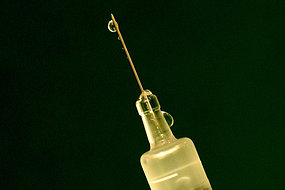Addiction Vaccines
Newsweek call them Anti-Drug Drugs: “A new generation of vaccines may enable doctors to inoculate people against addictive substances like cocaine and nicotine. A vaccine that would teach the immune system to attack and destroy cocaine before the drug reached the brain is poised to enter its first large-scale clinical trial in humans.”

In brief here is how the vaccines work, according to Newsweek.
Because the addictive drug molecules are small enough to evade the body’s immune system, they can slip undetected from the respiratory and circulatory tracts that absorb them and make their way into the central nervous system, where they work their dark magic. But when attached to a larger molecule—like an inactivated protein from a cholera-causing bacterium—the addictive substances can’t hide. The immune system develops antibodies that can latch on to the drugs when they are next ingested by themselves. Once attached to an antibody, a given drug cannot access its targets in the brain and is instead broken down by certain enzymes.
So although ingested, the addictive drugs won’t work. Thomas Kosten, at Baylor College of Medicine is working on a vaccine for cocaine. According to Baylor College, he says
“Blood vessels are distributed all over the brain, but the cocaine does not get into the brain because when it is bound to the antibodies, which are fairly large proteins, it cannot get through the blood-brain barrier (a natural formation that prevents foreign substances from going into the brain),” said Thomas Kosten. “It’s just like a big sponge for cocaine in the bloodstream.”
The idea is to “soak up” enough cocaine that addicts cannot get their “high.” If this goes on long enough, the researchers hope the addicts will quit the drug. A common tenet in psychology is if there is no reward, the behavior will ultimately stop.
Obviously the effectivity of the vaccine will vary by person, by drug, and perhaps by usage over time. Baylor College says:
During early studies in humans, researchers vaccinated subjects repeatedly over a period of three months. During this time, the subjects made large amounts of cocaine-specific antibodies. While the antibody levels drop within a year, they remain significantly high during the first few months. In that early period, if a vaccinated subject used cocaine, the antibodies prevented it from entering the brain and giving the person the cocaine “rush” that is attractive to addicts.
The abstract of Kosten’s 2005 paper (and full text if you want to pay) can be found here: “Vaccine pharmacotherapy for the treatment of cocaine dependence”
According to the Wall Street Journal there are two companies closest to releasing commercial products.
The two companies furthest along in the research are Nabi Biopharmaceuticals in Boca Raton, Fla., and Xenova Group PLC of Slough, England. Xenova Group is working on a cocaine vaccine and reports that the vaccine has reduced relapse in a small group of cocaine users.
Nabi Biopharmaceuticals is working on a nicotine vaccine. The company has completed a trial involving 68 smokers to test safety and measure the levels of antibodies produced by the vaccine. The vaccine has also resulted in smoking cessation among a group of participants.
The nicotine vaccine works like this, according to the American Psychiatric Foundation.
NicVAX is proposed as a therapy that could enhance current treatments for nicotine addiction by helping smokers who are trying to kick the habit resist the urge to light up. The hypothesis, said Leshner, is that the vaccine may inhibit nicotine’s “priming effect”—the phenomenon in which a formerly addicted individual experiences an increased desire to use a drug after a single exposure, which contributes significantly to relapse. A treatment program involving NicVAX might also include elements of cognitive-behavioral therapy and medication, such as bupropion, to help reduce withdrawal symptoms.


